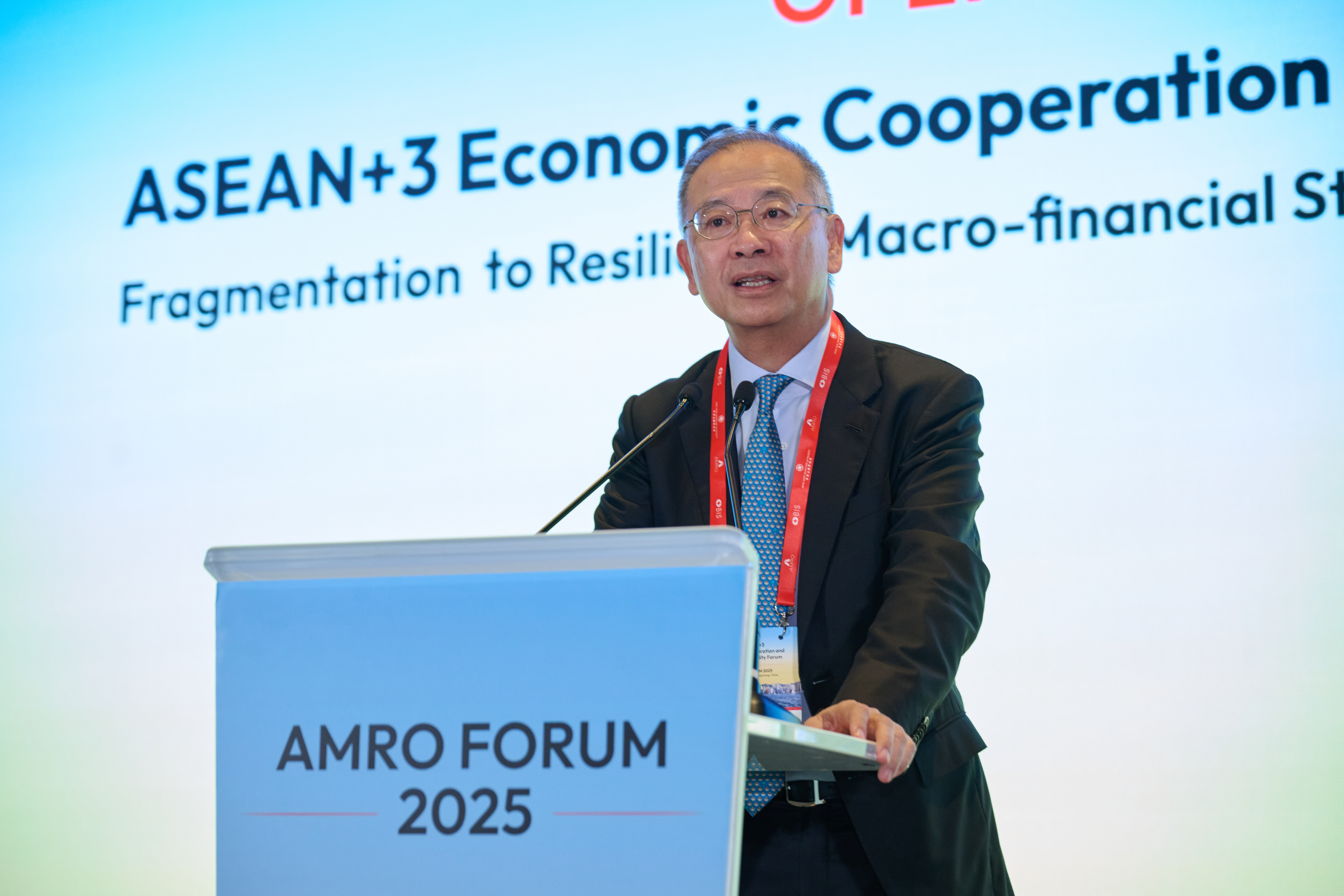Opening remarks at 4th ASEAN+3 Economic Cooperation and Financial Stability Forum
Speeches
25 Nov 2025
Opening remarks at 4th ASEAN+3 Economic Cooperation and Financial Stability Forum
Eddie Yue, Chief Executive, Hong Kong Monetary Authority
Good morning, Watanabe-san, Tao, distinguished guests, colleagues, ladies and gentlemen.
- This is the first time Hong Kong is hosting the forum. A warm welcome to you all — including those that are here in Hong Kong in person and those joining us virtually from across the globe—to the 4th ASEAN+3 Economic Cooperation and Financial Stability Forum.
- The theme of this year’s Forum - “Fragmentation to Resilience: Macro-financial Stability and Regional Integration in ASEAN+3” - speaks directly to the defining challenges of our time, including rising geoeconomic fragmentation, disrupted supply chains and emerging financial vulnerabilities.
- Yet, even as the external environment becomes more challenging, ASEAN+3 members have demonstrated a remarkable capacity to withstand shocks. Our region’s economic growth has remained resilient despite the tariff shocks. Our financial markets have remained stable during recent episodes of global market volatility, and our currencies have been stable for most of the time.
- This is a testament to the progress we have made over the past decades, including enhanced economic fundamentals, deeper local currency debt markets, and sound macro-financial policy. Importantly, progress in domestic reform and policy development is complemented by achievements in regional collaboration and integration. For example, the effort to develop local currency debt market is supported by coordinated efforts such as the ABMI (ASEAN+3 Asian Bond Markets Initiative) and the EMEAP ABF (Asian Bond Fund) initiative. The vast majority of bonds issued in the region are now denominated in local currencies, making us much less vulnerable to external spillovers. More generally, according to the BIS, EM Asia is more integrated than any other EME region, which will act as buffers against global fragmentation.
- But we cannot afford to be complacent. While tariff-related uncertainties have stabilised somewhat, the broader risks from the real economy and financial markets persist. The region also faces structural changes such as population aging, digitalisation and rise of AI, which present both opportunities and challenges.
- To handle these challenges, domestic policies and reforms are of course important, but deepening regional cooperation also plays a key role, in at least three key areas:
- First, deepen regional economic integration. A low hanging fruit is trade digitalisation, which can significantly streamline trade processes and empower SMEs to participate more fully in regional value chains. In Hong Kong, we have launched a number of initiatives to make trade finance more efficient and also accessible, including improving digital trade finance through the use of cargo data under Project Cargox, and leveraging innovative technology to tokenise trade documents under Project Ensemble. Benefits from these initiatives can grow exponentially when more jurisdictions come onboard, and we hope that jurisdictions that are here today will be able to join hands and work on those initiatives together.
- Second, expand the use of local currencies. While progress has been made, local currencies still play a relatively small role in the region’s cross-border transactions and external financing, and the bulk of our trade invoicing remains denominated in foreign currencies. We need to continue to enhance regional payments integration and local currency settlement to boost cross-border efficiency and strengthening economic resilience. This requires continued investments in deepening local capital markets, developing hedging instruments, and ensuring financial infrastructures are interoperable across borders. At the HKMA, we have connected our Faster Payment System (FPS) with its counterparts in Thailand and Chinese Mainland in recent years, and have developed a cross-border wholesale CBDC platform jointly with other central banks. Again, these are initiatives that we hope to take forward with our ASEAN+3 colleagues.
- Third, strengthen our regional financial safety net. The Chiang Mai Initiative Multilateralisation (CMIM) is a cornerstone of regional liquidity backstop. Ongoing effort to further strengthen and broaden the CMIM would further complement the safety net, and enhance the mechanism’s readiness and financial credibility to respond very quickly to potential liquidity pressures in the region.
- In all these endeavours, both AMRO and the BIS Asian Office play indispensable roles. AMRO’s timely and high-quality macroeconomic surveillance enhances policy coordination among ASEAN+3 members and preparedness for external shocks. The BIS Asian Office serves as a regional hub that facilitates dialogue and cooperation among central banks in the region. The HKMA remains committed to strengthening our collaboration with both, to advance regional financial integration and resilience.
- Today’s Forum is a good example of that collaboration. I am confident that the discussions today—on macroeconomic risks, on the shifting global financial landscape, and also on the priorities for cooperation—will generate valuable insights that will guide our collective efforts in the years to come.
- I wish you all a very productive and engaging Forum. Thank you.



